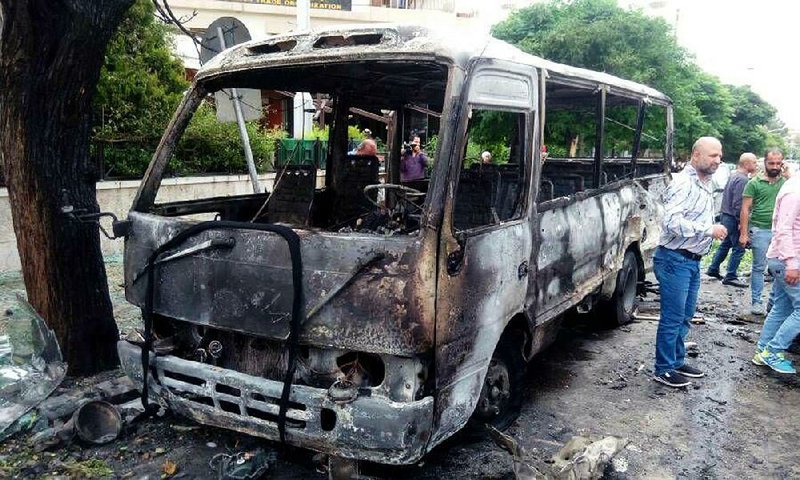JERUSALEM -- Iranian forces based in Syria fired 20 rockets at Israeli front-line military positions in the Golan Heights early today, the Israeli military said, triggering an Israeli reprisal and escalating already heightened tensions in what appeared to be the most serious violence in years.
The Israeli military said its Iron Dome rocket defense system intercepted some of the incoming projectiles, while others caused only minimal damage. There were no Israeli casualties.
The Syrian capital of Damascus shook with sounds of explosions just before dawn, and firing by Syrian air defenses over the city was heard throughout the night. An Israeli official said Israel was targeting Iranian positions inside Syria. Syrian state TV quoted a Syrian military official as saying Israel was targeting air defense positions and trying to hit radar stations.
Lt. Col. Jonathan Conricus, an Israeli military spokesman, said earlier that Iran's Al Quds force fired the rockets at several Israeli bases, though he would not say how Israel determined the Iranian involvement. The incoming attack set off air raid sirens in the Israeli-controlled Golan, which was captured from Syria in the 1967 war.
Israel "views this Iranian attack very severely," Conricus told reporters. He said Israel had responded, but did not provide details.
"This event is not over," he said.
Syria's state media said Syrian air defenses had intercepted "hostile Israeli missiles" early today that were fired over southwestern Damascus. Hours later, state-run Al-Ikhbariya TV broadcast a live feed of Syrian air defenses firing into the sky above the capital.
Syrian activists reported Israeli airstrikes hitting targets near Damascus.
An Israeli army spokesman, Avichay Adraee, said on Twitter that Israel was "acting against Iranian targets inside Syria," a rare admission by an Israeli official.
Syrian media said it was the first time in years that Syrians had fired at Israeli forces in the Golan Heights.
Israeli Prime Minister Benjamin Netanyahu traveled to Moscow on Wednesday to meet with President Vladimir Putin and discuss military coordination in Syria.
Together with Putin, Netanyahu toured a parade celebrating the anniversary of the World War II victory over the Nazis and then met the Russian president at the Kremlin for consultations. Netanyahu said he was eager to discuss ways of "solving crises and removing threats in a thoughtful and responsible manner."
After 10 hours together, Netanyahu said he conveyed Israel's obligation to defend itself against Iranian aggression.
"I think that matters were presented in a direct and forthright manner, and this is important. These matters are very important to Israel's security at all times and especially at this time," he said.
Israel views Iran as its archenemy, citing Iran's calls for Israel's destruction, support for militant groups across the region and growing military activity in neighboring Syria. Israel has warned that it will not allow Iran to establish a permanent military presence in Syria.
Israel's military went on high alert Tuesday, and bomb shelters were ordered open in the Israeli-controlled Golan Heights after reports of "irregular activity of Iranian forces in Syria." After an uneventful night, the military Wednesday called on residents to return to "full civilian routine," meaning studies and excursions would continue as usual, although the shelters would remain open.
Amos Gilead, a retired senior Israeli defense official, said at a security conference in the coastal town of Herzliya that Iran's intentions in Syria meant a wider conflagration may only be a matter of time.
"They want to build a second Hezbollah-stan," he said, referring to the Iranian-backed Lebanese Shiite militant group that last fought a war with Israel in 2006. "They are determined to do it, and we are determined to prevent it. It means we are on a collision course."
Information for this article was contributed by Sarah El Deeb, Josef Federman, Zeina Karam of The Associated Press.
A Section on 05/10/2018

